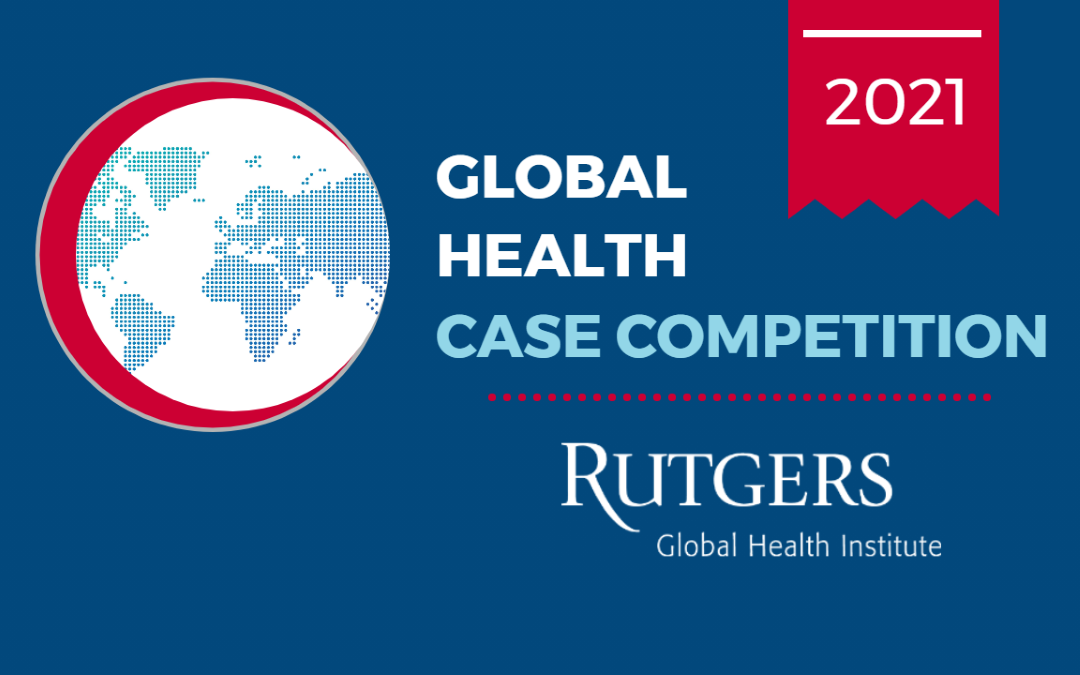Impressive. Inspiring. Creative. Collaborative.
These are just some of the words the judges used to describe the student teams and the proposals they presented during the final event of the university’s first-ever Global Health Case Competition, which Rutgers Global Health Institute hosted virtually on April 6.
The two-hour pitch event was the culmination of a 10-week experience that involved 48 Rutgers students from more than 30 undergraduate and graduate programs universitywide. In January, these students formed eight interdisciplinary teams that worked together throughout the semester, under the guidance of a faculty mentor, to devise solutions in response to the impact of COVID-19 on vulnerable communities in New Jersey.
The specific case the teams addressed centered around a family living in New Brunswick, whose experiences, though fictional, are rooted in reality. A single mother and her 8-year-old son are struggling because of factors related to and exacerbated by the COVID-19 pandemic. These factors include food and housing insecurity, health care access, language and literacy barriers, childcare and education dynamics, immigration status, work requirements, family obligations, cultural nuances, and mounting stress.
The teams’ task was to propose a community-based initiative that would address one of four broad categories—health care access and delivery, housing and food insecurity, COVID-19 health communication, and pediatric mental health—within the context of the case. For the final event last week, each team produced and presented a five-minute video to pitch its proposal to a panel of seven judges, and a short question-and-answer session followed. Each team’s pitch was judged according to a scoring rubric that incorporated criteria such as depth and breadth of analysis, sustainability and scalability, comprehensiveness of an action plan and contingencies, clarity, and novelty.
Watch a video of the final event:
Three teams were declared winners, and they will receive cash prizes as well as support from the institute to explore implementing their solutions in the community.
First Place – ZipPea Pantry
Proposal: Designed to support New Brunswick’s existing food security network, ZipPea Pantry is a service that would deliver food, sourced from the city’s established food banks and community kitchens, to residents who are not able to access these services for reasons that include transportation, work schedules, domestic responsibilities, and physical abilities.
Team 8 members: Julia Bland, David Chapinski, Douglas Colbert, Judy Lam, Jessie Sullivan, Clairisse Whang, and faculty mentor Shauna Downs
Prize: $1,000 and implementation support
Second Place – Partnering With Religious Organizations for Preventative Screening (PROPS)
Proposal: The PROPS initiative would provide training, equipment, and educational materials to community-based religious organizations, enabling them to offer preventative health screenings, such as blood pressure and weight monitoring, to their members at their worship locations.
Team 7 members: Maria Galkin, Jerry Kong, Katie Lynch, Nidhi Mittal, Nazia Shaheed, Kirsten Spichiger, and faculty mentor Gloria Bachmann
Prize: $500 and implementation support
Third Place – Addressing Pediatric Mental Health in New Brunswick High School
Proposal: This initiative centers around creating a software app that would be installed on students’ school-issued Chromebook computers to provide greater access to mental health screening, prevention, and intervention resources.
Team 6 members: Meha Aggarwal, Abiola Biriowo, Ryan Downey, Krupali Shah, Matt Slavin, and faculty mentor Vicente Gracias
Prize: $250 and implementation support
More information about the eight teams and their proposals is available on the Global Health Case Competition webpage.
Rutgers Global Health Institute core faculty members Kevin Lyons and Harsh Sule were faculty advisors for the case competition planning committee and judges for the pitch event. Sule, who is an associate professor of emergency medicine at New Jersey Medical School, says that the students worked hard to understand the complexities involved in the case and to address the needs at stake.
“That is what I think every participant, every team, really did,” Sule said. “They thought beyond the privileges they may have of studying or working at home, ordering groceries for home delivery, having multiple rooms in their home and enough bandwidth to do virtual school. These were all some of the challenges that they really looked into in-depth, and each of the teams’ pitches really captured the essence of what we were looking for.”
Lyons is an associate professor of professional practice in the supply chain management department at Rutgers Business School–Newark and New Brunswick. “All the teams that presented today, I really felt that there was a theme that rode right through it all, and that was the collaboration that you all weaved into your presentations. With the university, with our strategic partners in the community, with faith-based organizations—those [proposed collaborations] were really well conceived and really well done,” he said.
The Global Health Case Competition was funded by an Inclusion, Diversity, Equity, and Advocacy (IDEA) Innovation Grant from Rutgers Biomedical and Health Sciences. The case competition has been in development for more than a year and was brought to fruition by the Rutgers Global Health Institute staff and student council, including the eight-member student planning team; faculty advisors; and community partners.

